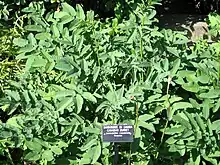| Sanguisorba canadensis | |
|---|---|
 | |
| Canadian burnet | |
| Scientific classification | |
| Kingdom: | Plantae |
| Clade: | Tracheophytes |
| Clade: | Angiosperms |
| Clade: | Eudicots |
| Clade: | Rosids |
| Order: | Rosales |
| Family: | Rosaceae |
| Genus: | Sanguisorba |
| Species: | S. canadensis |
| Binomial name | |
| Sanguisorba canadensis | |
Sanguisorba canadensis, the white burnet[1] or Canadian burnet, is a species of flowering plant in the rose family Rosaceae, native to North America. This herbaceous perennial commonly grows in bogs, swamps, and roadsides from Labrador to Georgia. It grows four to five feet (1.2 to 1.5 m) tall, with creamy white flowers in cylindrical spikes, appearing from summer into autumn.[1]
Unlike its close relatives, Sanguisorba officinalis (great burnet) and Sanguisorba minor (salad burnet), the leaves must be cooked to be eaten, in order to remove the bitterness.[2]
References
- 1 2 "Sanguisorba canadensis". RHS. Retrieved 28 August 2021.
- ↑ Gardner, Jo Ann; Holly S. Dougherty (2005). Herbs in Bloom. Timber Press. p. 293. ISBN 978-0-88192-698-9.
This article is issued from Wikipedia. The text is licensed under Creative Commons - Attribution - Sharealike. Additional terms may apply for the media files.